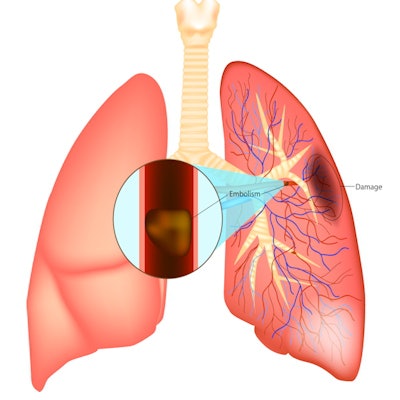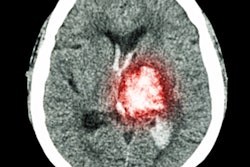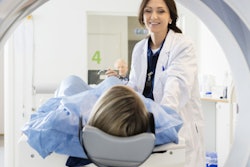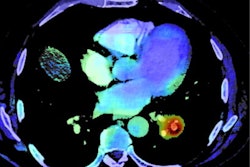
CT pulmonary angiography (CTPA) shows that omicron COVID-19 increases patients' risk of pulmonary embolism (PE), according to a U.K. study presented on March 5 at ECR 2023 in Vienna.
And though this study result may not be surprising, keeping it in mind is crucial for resilient radiology patient care during times of crisis such as a pandemic, said presenter Dr. Jungwoo Kang of Northwick Park Hospital in London, U.K.
"Unsurprisingly, inpatients with omicron COVID have a significantly greater pulmonary embolism prevalence," he said. "[But] assessing CTPA usage may be beneficial for planning of radiology services in future pandemics."
The U.K.'s National Health Service (NHS) has ceased mandatory COVID-19 testing of asymptomatic patients, in part because the omicron variant of the virus is less severe and more people have been vaccinated, Kang and colleagues noted in their study abstract. But since omicron tends to be asymptomatic and is often transmitted in hospital settings, this strategy carries "significant risk to inpatients," the group wrote.
As there's a lack of research comparing the risk of PE in omicron-COVID-19 and non-COVID patients, Kang's team conducted a study to address this knowledge gap. The work included data from 35,367 patients who underwent CTPA between January and April 2022 in two U.K. hospitals; of these, 688 had a COVID-19 diagnosis and 34,679 did not. The team tracked patient age, sex, COVID status, CTPA results (pneumonia, pulmonary embolism), and vaccination status. COVID-19 patient data were compared to that of a cohort of patients admitted to the hospital from the emergency department during the same time frame.
| Comparison of PE risk between non-COVID and omicron-COVID patients | ||
| Condition | Non-COVID patients | Omicron-COVID patients |
| Prevalence of pulmonary embolism (per 1,000 inpatients) | 6.2 | 33.3 |
| Increased mortality from acute PE (adjusted odds ratio)* | 1.25 | 3.90 |
The group also found that omicron-COVID-19 patients were more likely to undergo CTPA than their non-COVID-19 counterparts, with an odds ratio of 3.37 (with 1 as reference) and that omicron-COVID-19 patients accounted for 13.2% of all inpatient CTPA exams during the study time frame despite making up only 1.9% of new admissions.
The study findings not only suggest that radiology departments must be prepared to cope with high-demand situations such as pandemics but also highlight the importance of managing the risk of disease transmission among patients admitted to the hospital, according to Kang and colleagues.
"Limiting omicron nosocomial [hospital-acquired] spread is necessary to reduce inpatient morbidity/mortality and demands on busy radiology departments," they concluded.



















